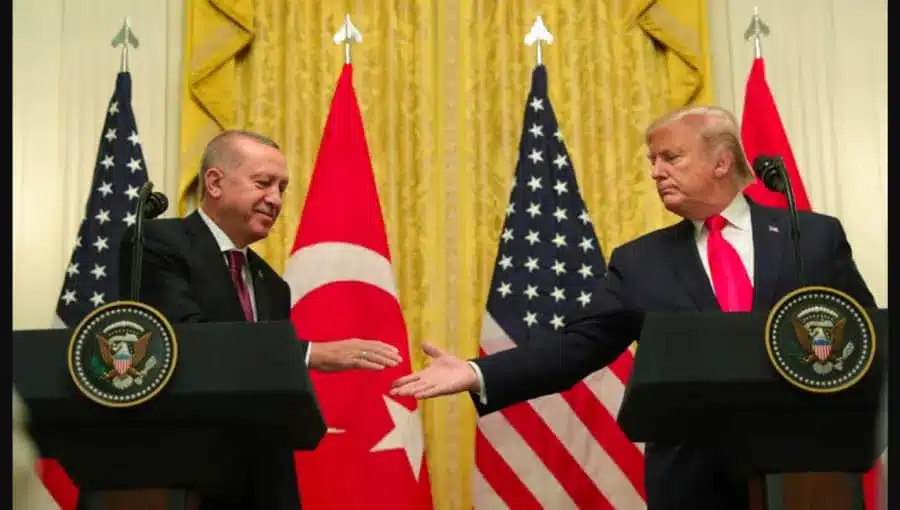

As the United States sharpens its economic tools to counter Russia’s war in Ukraine, a recent proposal by Senator Lindsey Graham to impose sweeping secondary tariffs on countries importing Russian energy has raised concerns not only in Moscow, but in Ankara as well.
While President Donald Trump’s administration is currently considering tariffs as high as 100% on such transactions, Senator Graham has publicly advocated for rates up to 500% — a figure that has drawn sharp scrutiny, particularly from Turkey, one of Russia’s major trading partners.
According to TurkStat, Turkey imported more than $32 billion in energy from Russia in 2024, making it Russia’s third-largest trading partner, after China and India. During the same period, Turkish exports to the United States totaled $14.4 billion, primarily in machinery, motor vehicles, defense-related products, and textiles. Any significant tariff increases on Turkish goods — particularly if applied to sectors indirectly linked to Russian energy trade — could severely disrupt Turkey’s access to the U.S. market.
That possibility has drawn growing attention in Turkish policy circles. A recent article in Aydınlık described the proposed tariffs as a potential threat to Turkey’s economic stability, warning that they could be interpreted as politically motivated rather than purely strategic. Commentators across Turkish media have also pointed to past tensions in U.S.-Turkey relations — including Senator Graham’s vocal support for armed groups in northern Syria — as part of a broader pattern. His prior meetings with the leadership of the Syrian Democratic Forces (SDF), some of whose high-ranking commanders are formally accused in Turkey of links to the PKK, have long fueled suspicion in Ankara. Those concerns are once again resurfacing, especially now as U.S. positions in northeastern Syria remain in delicate balance.
This context matters. Ankara views security in Syria and energy policy as closely linked strategic concerns. Despite new Syrian government reaching an agreement to integrate the SDF, Kurdish leader Mazloum Abdi has publicly rejected the idea of surrendering territorial control or dissolving the autonomous administration. This position casts doubt on the future of negotiations and underscores ongoing tensions. For Turkey, which supports Syria’s territorial unity, continued U.S. engagement with the SDF — combined with proposed economic measures — risks deepening mistrust at a time when NATO coordination remains vital.
Turkey’s position in NATO remains critical. As a founding member and a key logistical and military partner, Turkey plays an essential role in the alliance’s southern flank and in access to the Black Sea. Since the beginning of the war in Ukraine, Turkey has walked a complex line — maintaining strong ties with Kyiv while preserving critical energy and trade relations with Moscow. Ankara’s efforts to mediate between Russia and Ukraine have, at times, complemented broader Western goals, even when energy cooperation with Russia has complicated the picture.
To date, the Trump administration has not endorsed Senator Graham’s proposed 500% tariff figure. However, the 100% secondary tariffs currently under consideration are still viewed by many in Ankara as alarmingly high — high enough to significantly disrupt U.S.-Turkey trade and strain a long-standing strategic partnership. For Turkish officials and industries, such a measure would not be seen as a routine sanctions tool, but as a punitive act with direct economic and political consequences for a NATO ally.
The broader concern in Ankara — and increasingly among analysts in Washington — is that figures like Senator Graham continue to push unilateral, hardline proposals that risk undermining the United States’ position in the region. While the Trump administration has emphasized the importance of maintaining strong ties with key partners, these efforts are being complicated by internal pressure from lawmakers whose approaches prioritize maximum coercion over long-term alliance stability.
As the administration weighs its next steps, it will need to ask whether imposing aggressive secondary tariffs — even at the 100% level — truly serves the objective of weakening Moscow, or whether it risks alienating countries Washington relies on to uphold regional security. In a global landscape shaped by complex interdependencies, isolating adversaries cannot come at the expense of isolating allies.
MORE COVERAGE & UPDATES: Trump Administration | Donald Trump